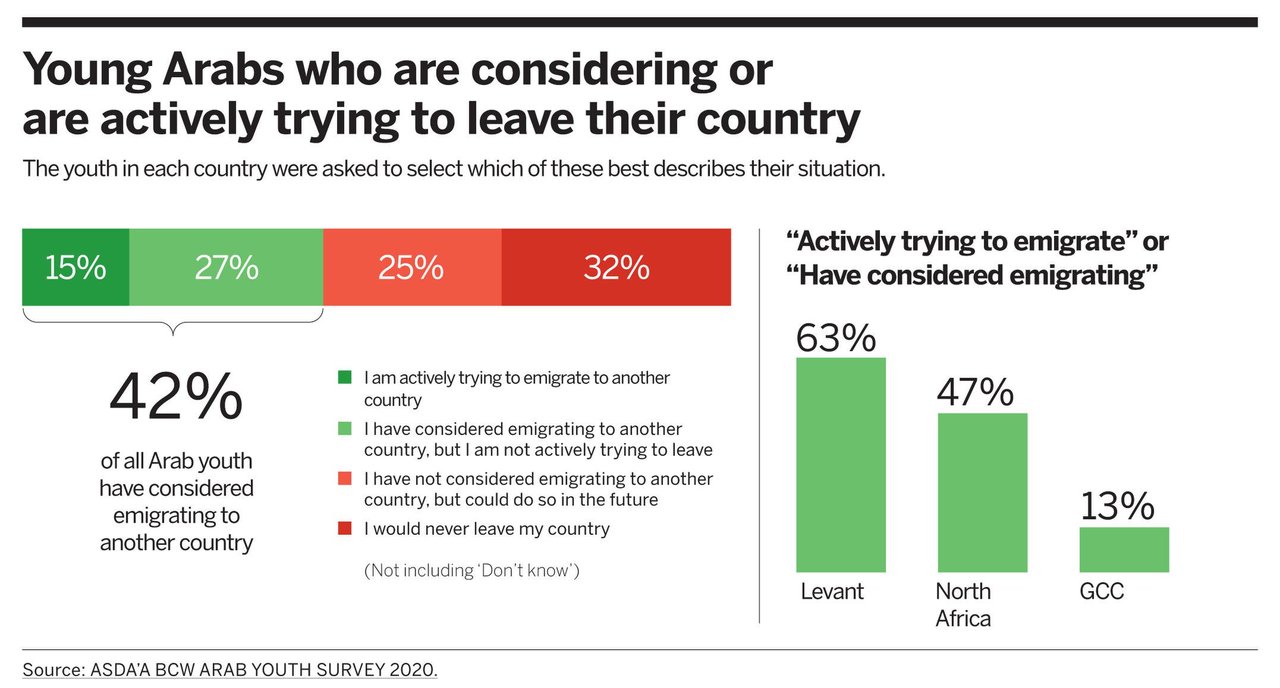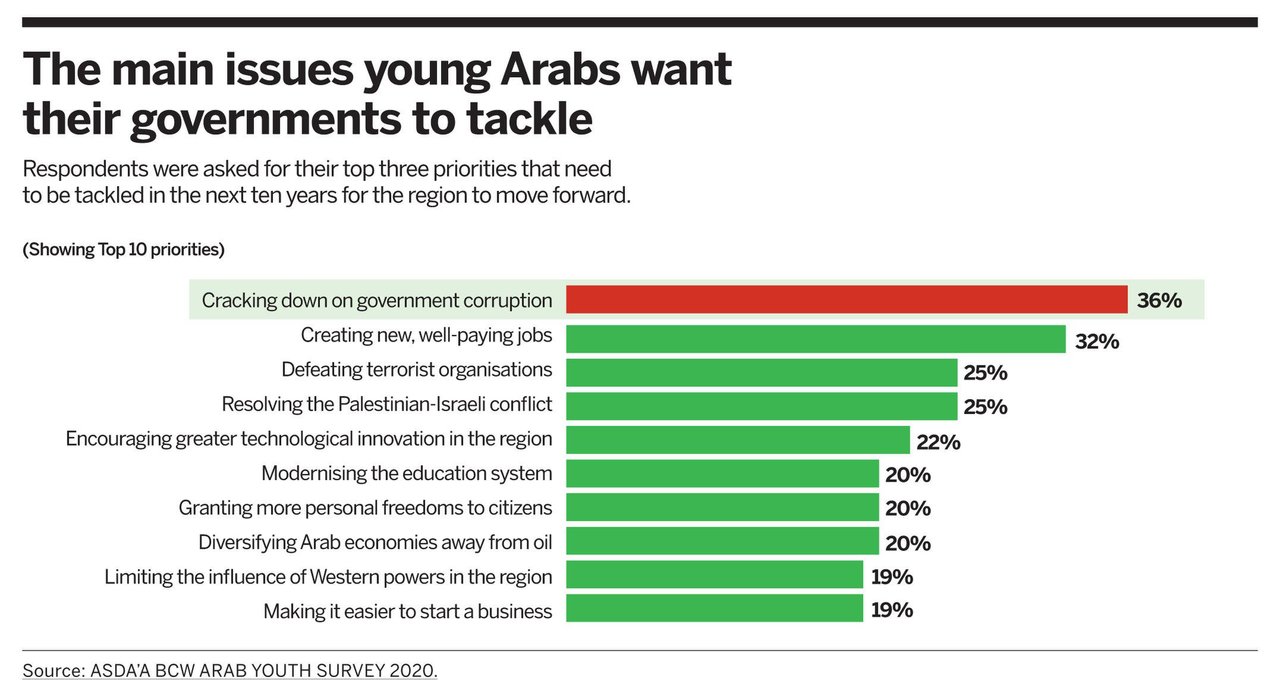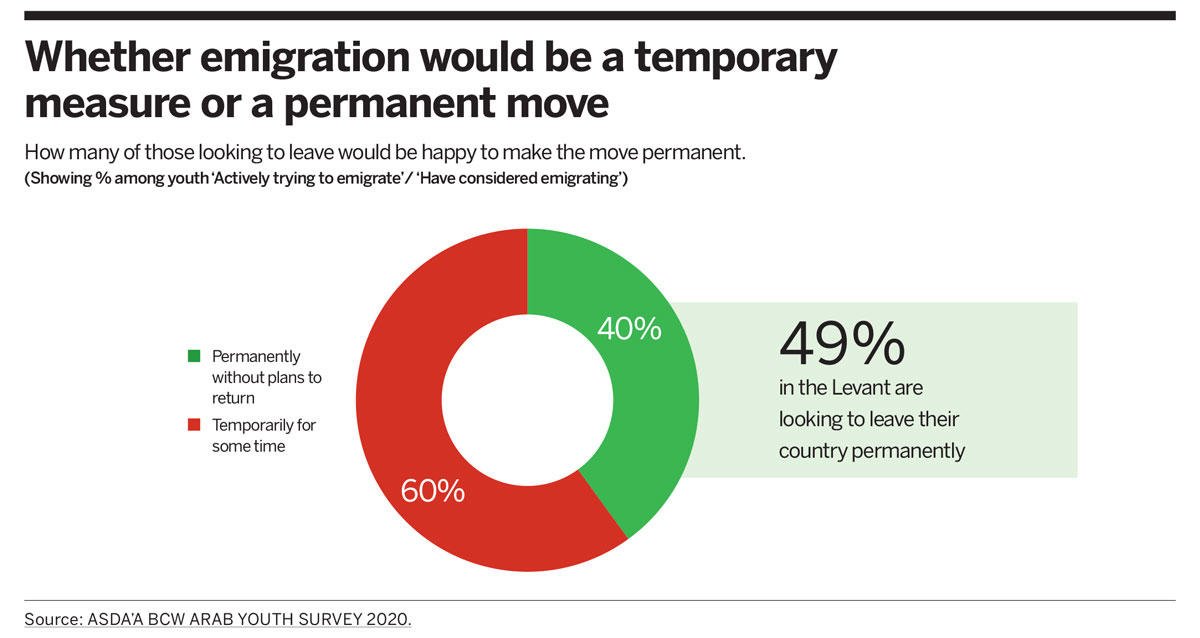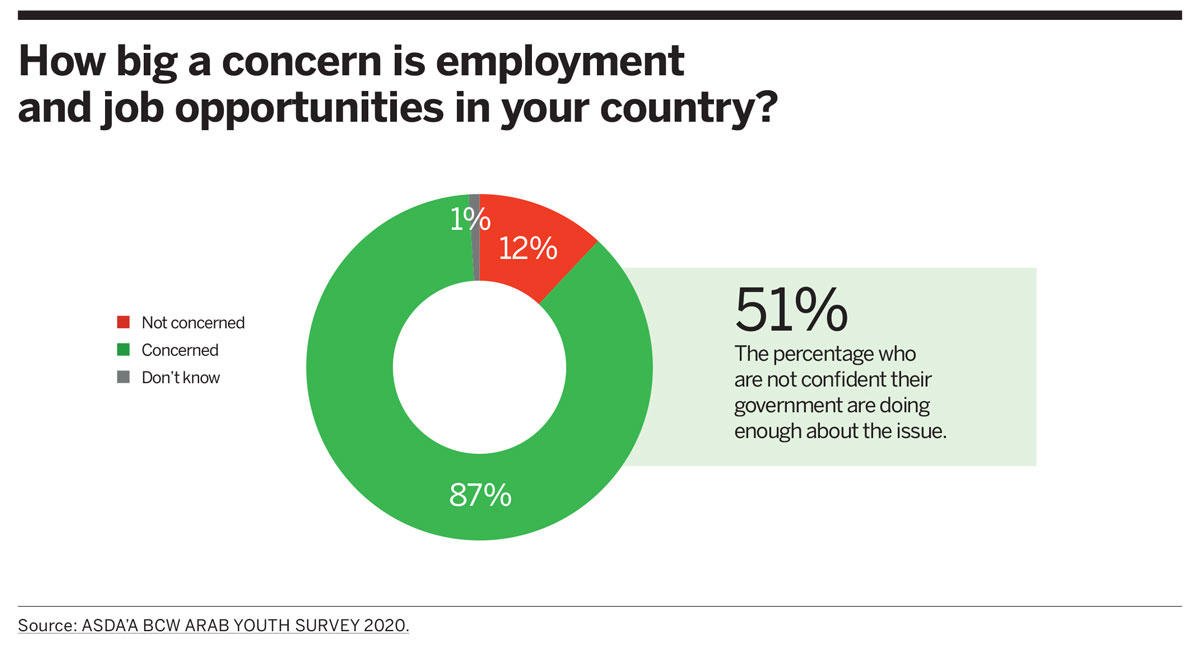
Unemployment and corruption: why millions of young Arabs mull quitting their homelands
Nearly half of 200 million young Arabs in the Middle East and North Africa (MENA) region have considered leaving their country, frustrated with struggling economies and widespread government corruption, according to the findings of the 12th Annual ASDA’A BCW Arab Youth Survey.
Released on Tuesday, the survey also reveals that the coronavirus pandemic has further increased young Arabs desire to emigrate, with one-third of the region’s youth more likely to want to leave their country.
Regionwide, 42 percent of young Arabs have considered emigrating to another country, with the desire to leave most prevalent (63 percent) among youth in the Levantine states of Lebanon, Iraq, Jordan, Syria, Yemen and Palestinian Territories.

Meanwhile, young people in the oil-rich Gulf Cooperation Council (GCC) states are least likely (13 percent) to consider leaving.
The primary drivers of potential emigration are economic reasons (24 percent) and corruption (16 percent), with educational opportunities, new experiences and safety and security also playing a significant role.
The findings of MENA’s largest independent study on youth conducted for ASDA’A BCW by PSB, a global strategic research and analytics consultancy, reveals the opinions of young Arabs on a range of subjects including the anti-government protests that raged through parts of the region during the past year, gender rights, personal identity, employment, personal debt, foreign relations and media consumption.
The survey polled 4,000 young Arab nationals aged 18-24 from 17 Arab states in the Middle East and North Africa with a 50:50 male female split. The research was conducted in two phases, with the main survey polling between January 19 and March 3, before the Covid-19 pandemic impacted the region and the second, Covid-19 Pulse Survey, between August 18 and 26, conducted in six Arab states.

“The findings of our Arab Youth Survey highlight the unique complexities and opportunities that must be addressed to meet the aspirations of young people in the Arab world,” said Donna Imperato, Global CEO, BCW (Burson Cohn & Wolfe).
“These insights on the region - one of the most diverse in the world and where the under-30s make up two thirds of the population - form the basis of the communications counsel that we provide to our clients, including governments, civil society organisations and the private sector.”
“As an independent study, the ASDAíA BCW Arab Youth Survey has consistently delivered evidence-based insights on the hopes and frustrations of young people in the Arab world,” said Sunil John, president, Middle East, BCW and Founder of ASDA’A BCW.
“Set against the backdrop of street protests and a sharp oil price decline that have led to acute government budget deficits, the study demonstrates the link between poor governance and lack of opportunities. The findings underpin the need for many parts of the MENA region to focus on and nurture its youth dividend or risk losing a generation of its brightest young people.”

Following a wave of anti-government protests across the region over the last 12 months, the survey reveals that almost nine in 10 young Arabs in Algeria, Iraq, Sudan and Lebanon supported the protests in their own countries.
A majority of the youth in these four countries said they are optimistic that the protests would lead to real positive change.
Protests resulted in the ousting of Omar Al-Bashir after nearly three decades in power as president in Sudan, and the resignation of Abdelaziz Bouteflika after over two decades as the president of Algeria while Lebanon and Iraq also both saw a change in leadership.
The Covid-19 pandemic appears to have added to the possibility of more unrest, particularly in Lebanon, where nearly three-quarters of respondents in the Covid-19 Pulse Survey said they believe the pandemic has made protests against the political status quo more likely.
“The link between the protests and corruption can also be inferred from the fact that tackling government corruption is seen as the single largest priority for achieving progress in the Arab world (36 percent of all respondents), ahead of any other issue, including creating well-paying jobs (32 percent), and defeating terrorist organisations or resolving the Arab-Israeli conflict,” John added.

The survey also debunks stereotypical notions of the region, particularly on gender rights. A strong majority of young Arab women (75 percent) say they have the same or more rights as men in their country. Young Arab women (76 percent) and men (70 percent) agree that a woman can benefit her family more by working than staying at home.
Arab youth also see Saudi Arabia and the UAE as the two rising Arab powers that have most influence on the geo-political environment of the region (39 percent and 34 percent, respectively). Among non-Arab states, the United States is seen having increased its influence in the region the most over the past five years. This year, the US is also seen more favourably (56 percent) by Arab youth than in 2019 (41 percent) or any point since 2016.
For the ninth consecutive year, the UAE continues to prevail as the preferred nation for young Arabs to live in (46 percent) and for their own nation to emulate (52 percent). The United States is the next most popular country among Arab youth to live in (33 percent) and emulate (30 percent).
Other key findings from the survey include:
1. Religion is seen as the most important aspect of the personal identity of young Arabs (40 percent), more so than their family, nationality, gender and other factors.
2. Arab youth are increasingly embracing the digital revolution: In 2015, just 25 percent young Arabs cited social media as their source of news, this year, 79 percent say they get their news from social media. Since 2018, e-commerce has also experienced exponential growth among Arab youth and a large majority (80 percent) now shop online.











